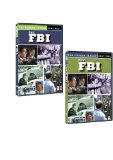| Reviews & Columns |
|
Reviews DVD TV on DVD Blu-ray 4K UHD International DVDs In Theaters Reviews by Studio Video Games Features Collector Series DVDs Easter Egg Database Interviews DVD Talk Radio Feature Articles Columns Anime Talk DVD Savant Horror DVDs The M.O.D. Squad Art House HD Talk Silent DVD
|
DVD Talk Forum |
|
|
| Resources |
|
DVD Price Search Customer Service #'s RCE Info Links |
|
Columns
|
|
|
FBI: The Fourth Season, Parts One & Two (Warner Archive), The
You'd think the word would get out to all the various punks, kidnappers, Commie spies, grifters, embezzlers, and killers: you can not beat the F.B.I....in 1968, at least. Warner Bros.' terrific Archive Collection vault of hard-to-find library and cult titles has released The FBI: The Fourth Season, Parts One & Two, a 2-volume, 7-disc, 26-episode collection of the hit ABC crime actioner's 1968-1969 season. Even though I didn't review the third season, I can pretty much guarantee that nothing too radical has changed for this fourth go-around...because it plays exactly the same as seasons one and two (with the exception of William Reynolds coming on board). And with this kind of assured, polished storytelling routinely featuring an absurd amount of top-flight supporting players for every episode...who wants anything to change? No extras for these okay transfers.
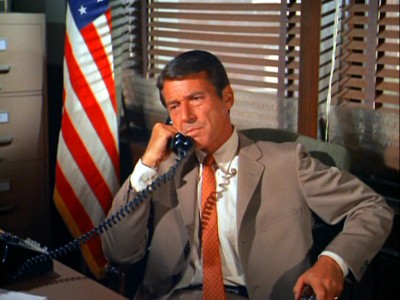
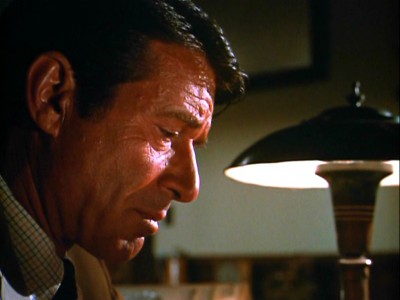
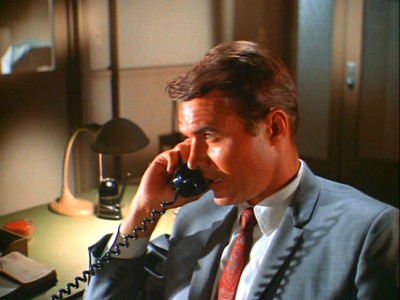
Considering how much mayhem―murder, extortion, espionage, kidnapping, race-baiting, robbery―is present during this fourth season of The FBI, it's deeply ironic that many viewers very probably came to the series on Sunday nights for a little respite from the real-life horror show going on outside their windows during the height of the counterculture revolution. That revolution is all but non-existent here in this 1968-1969 season, with one or two vague references to Vietnam (strictly as character markers, not as discussion points), and one or two social ills (prejudice against Indians, Black ghetto poverty) politely referenced in the background of a more amicable, generic murder or kidnapping storyline. If we believe what we read about The FBI, Bureau chief J. Edgar Hoover, not Quinn Martin, had a lock on the series' zeitgeist, and he wasn't about to let the real-life chaos embroiling the streets of America infect his picture postcard image of the Bureau, or sully these small-screen unemotional, square-jawed, cleft-chinned agents who always zap the bad guys and wrap up the case.
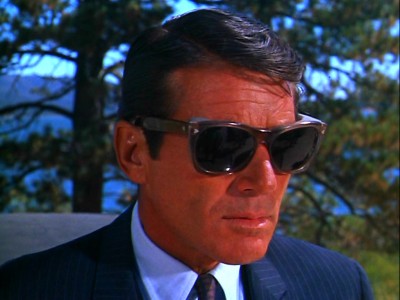
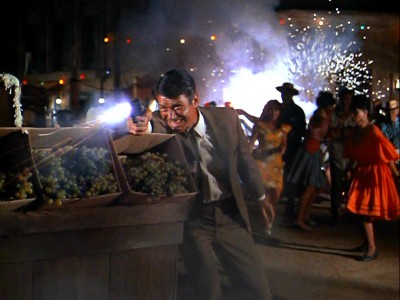
And I don't have a problem with that at all. Of course The FBI is a highly idealized, pro-Establishment take on the reality of crime in America at the time...but it's no more intellectually dishonest than the romanticized, faux-ironic (and just as entertaining) tripe that was Bonnie and Clyde. Movie and TV critics that lean left (and that would be about 99% of them) love to derisively sneer and snort at straight-laced entertainment they deem old-fashioned or "traditional" or authoritarian or (god forbid) conservative―and The FBI is all of that, first and last― but they have little stomach (or a saving sense of humor) for viewing their own Lefty fantasies as anything but self-serious "Truth." I don't believe that The FBI is duplicitous or "evil" for not presenting a more accurate view of 1968 America, because I don't believe that was its raison d'être, anyway. It's a TV actioner meant to sell soap, after all, a police procedural meant to entertain, and if its political and social viewpoints come from one side or the other which you may or may not agree with, well...welcome to the Arts, because they all do that. I find The FBI's studied emphasis on comic book action and metronome-like suspense admirable; the show knows it's own head and it doesn't stray. It is storytelling at its most minimal in terms of character motivation or political or sociological influence, and since that approach is pulled off with confident assurance, it's aesthetically successful. For instance, The FBI assumes (rightly) that we already know Commies stink, so why have a superfluous political discussion about "the Cause," as it's amusingly referred to here? Plotting is king in The FBI; its pleasure comes from the show's icy cool efficiency in moving from polished set-up to polished set-up―the slim, implied psychology of the characters and their motives comes at least as much from the expert performances here, as from any bare-bones, brief exposition we might get as to their circumstances.
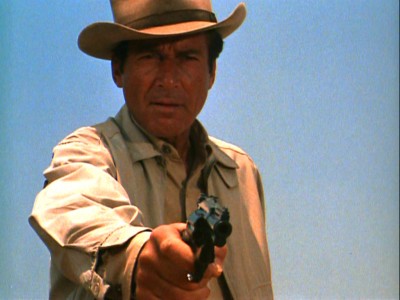
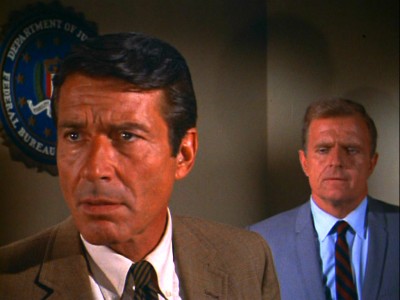
And what a remarkable array of actors and actresses that show up this season. Michael Tolan's low-key turn in Wind It Up and It Betrays You is nicely played against Louis Jourdan as a Commie spy master who's losing his temper with the incompetents who surround him (series director William Hale jazzes up his frames in this one, including a startling shot of a man drowned in a tub). James Franciscus is well cast as a hot-shot wildcatter willing to kill to keep his oil company in Out of Control. Taking a break from their AIP drive-in duties, Dean Stockwell and Susan Strasberg headline The Quarry, directed by series regular Robert Day; it's a tight, entertaining chase entry. The Runaways, scripted by Arthur Heinemann, starts out like a Fugitive episode, with Ronny Howard's runaway/petty thief teaming up with cold-blooded killer J.D. Cannon. However, the expected sentimentality and even the basics of the father-son surrogacy angle are muted in favor of straight storytelling (Dabs Greer, one of the all-time greats, is superlative in just a few short scenes as Howard's uncle). Emblematic of The FBI's cold tone, when Howard, after cooperating with the Feds, comes back to thank Zimbalist, Jr. for helping to straighten his life out, Zimbalist doesn't miss a beat and flatly states, "You do realize you'll still have to face charges for breaking and entering." And thank you!
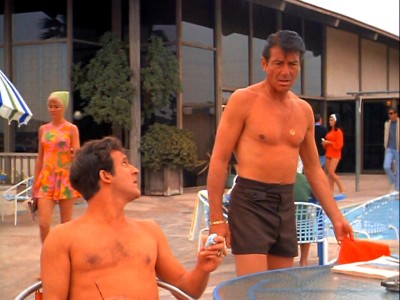
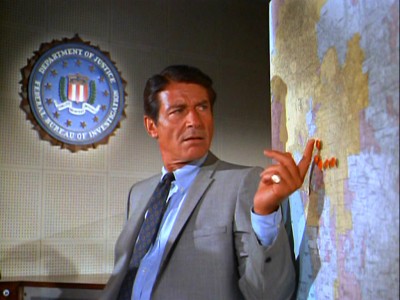
Death of a Fixer's solid cast―delectable Jessica Walter, Joe Campanella, Daniel J. Travanti, Barry Atwater, and Brooke Bundy―do well in scripter Robert Heverly's Mafia tale that finds Zimbalist undercover in Miami. Jeffrey Hunter, looking slightly frazzled, shows up in The Enemies as a Commie spy stealing rocket fuel. Better, though, is Cicely Tyson feuding with husband (and Hunter's Vietnam buddy) Al Freeman, Jr., over giving Hunter shelter and aid from the pursuing Feds. Excellent character actor Peter Mark Richman gets a chance to be dramatic, romantic, and comedic with charming Dorothy Provine in Breakthrough, a solid mobster story from Frank Crow that left-turns into a love story. It's amusing to see Grant Williams, of Hawaiian Eye (a rip-off of Zimbalist's 77 Sunset Strip), show up and work with Erskine, and one of my favs, Edward Andrews, has a terrific scene as a mob boss letting his flunky know he doesn't like to lose at pool. The FBI isn't the right kind of series for lovely, talented Diane Baker to shine in; she needs something like Route 66 to stretch. Still, it's nice seeing her in color in The Harvest, romancing Burt Brinckerhoff, who has a nice chemistry with familiar face, Larry Gates (unfortunately, Robert Duvall is wasted in a tiny part here). The Intermediary is a straightforward heist story by noted crime writer, John D.F. Black (Shaft), with TV's version of Paul Newman, Monte Markham, getting noticeably violent with his gang (Michael Strong doesn't have much to do, but Maurice Evans seems to be having fun in his two or three scenes). The Butcher is a too-obvious affair by Barry Oringer that has Nazi Charles Korvin getting gunned down at a synagogue (pretty Anne Helm is no help here, nor is stick-in-the-mud Ralph Bellamy). The Flaw is a cleanly, simply directed spy entry by Robert Douglas, with Barry Morse, Victoria Shaw, Donald Harron, and Marie Windsor shown to good advantage (Douglas knows how to stage a suspenseful sequence, such as the one where Zimbalist's room is searched). The Widow, a not-too-terribly original take-off on the old badger game, is memorable for the unlikely pairing of Lynda Day (George) and Arch Johnson, with Glenn Corbett coming off as anonymous, as usual. Much better is Eye of the Storm, one of this season's more overt "social message" episodes. A familiar story of kidnapping is the main focus of the story, but the subtheme of poverty in the ghetto comes through (Billy Dee Williams and the breathtaking Denise Nicholas are excellent here, conveying a lot more to the audience than is present in Don Brinkley's script).
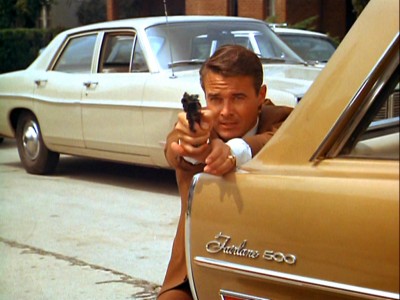
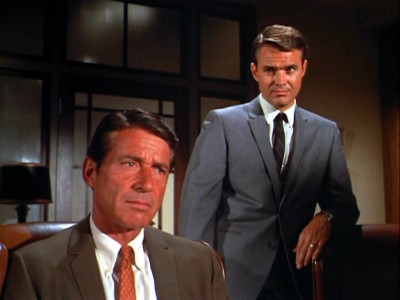
The Fraud, written by Michael Fisher, has an unusual premise―Mob boss William Smithers is flogging art forgeries painted by hippie Hal Holbrook―that leads to an entertaining conclusion (the season's best line comes from stone-cold Smithers, of Dallas fame: "Psychological upheavals are for Beverly Hills matrons," he sneers). Caesar's Wife, a boring May-December romance/espionage outing, is notable only for a young Harrison Ford in a lead role (insipid, insufferable Claudine Longet is along for the ride, too). Gilbert Roland has a showy part in The Patriot, while great character actor Steve Ihnat does equally well in The Maze, on the run from everyone after shooting a border guard (crazy hot Ina Balin does a nice Greek dance; Joan Van Ark is instantly likable, and poor John Kerr wanders around in a tiny bit part―all of them, though, recoil next to Simon Oakland's laughable histrionics). A powerhouse cast―Tim O'Connor, Linden Chiles, Ed Asner, Louise Latham, and fav Arthur Hill―head up The Attorney, a dense little suspenser from Robert Heverly. Gerald Sanford's The Catalyst benefits from series regular Jesse Hibbs' muscular direction in this familiar-but-welcome actioner set in the desert when Zimbalist's plane crashes into the desert (Norman Fell gets drilled by Alejandro Rey...who isn't too bad here, actually). Big-screen icon Gene Tierney shows up for Conspiracy of Silence, a particularly dense, complicated story from Mark Weingart of the Mob trying to take over a retirement community. Joining Tierney is a great supporting cast: James Daly, Kevin McCarthy, Kent Smith, and Ken Lynch. The Young Warriors is the other "message-y" episode this season, well-developed by scripter Mark Weingart, about conflicts between Indians and Whites that shows signs of promise (everyone, both Indian and White, are flawed) until its "nothing to see here, move along" happy ending. Moment of Truth, however, takes an interesting premise―bank manager Richard Carlson is using crippled football hero Michael Witney as bait to lure veterans into loan sharking deals―and turns it into a rather desultory affair.
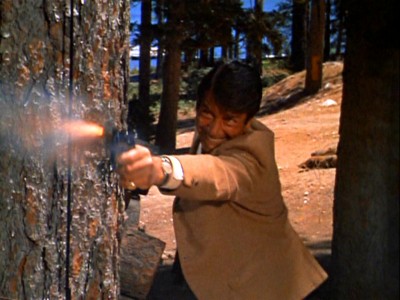
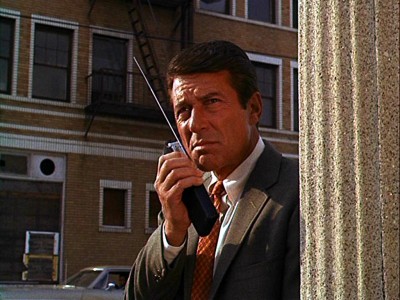
No such problem for these last four episodes, though; my favorites this season. The Cober List, scripted by John D. F. Black, is a nasty, intricate Mob piece about warring family members...and stamp collecting (!). Filled with memorable lines (father Harold J. Stone to Zimbalist, after his traitor son Don Gordon is gunned down, "If that dies...bury it face down,"), The Cober List is a sharp, smarty entry. A Life in the Balance, written by Arthur Heinemann, is a straightforward, relentless little thriller starring all-time favorite Jimmy Caan as a violent psychopath who wants to kill his kidnapping victim. That expert scene-stealer, Murray Hamilton, works well off Caan, and Julie Sommars is quite good as the doomed girlfriend. It's expertly crafted by director Robert Douglas. The Hero, scripted by John W. Bloch, takes the all-too-soon-to-be-TV-staple "the returning Vietnam vet-as-psycho" story and turns it on its ear: "veteran" Chad Everett never served. He only pretends to be an Air Force war hero...inbetween strangling his new brides. Everett, a better actor than he was ever given credit for, is great as the slimy, charming whack-job, with familiar faces Kathleen Widdoes, Carmen Mathews, Lorri Scott, and Paul Smith adding good support (Everett's scene with funnywoman Reta Shaw, cramming her foot into a shoe three sizes too small, is priceless). It's directed for maximum suspense by Gunnar Hellström. And speaking of psychos, what sixties series would be complete without an appearance by Bruce Dern? In The Nightmare, scripted by Penrod Smith and directed by Jesse Hibbs, he and sexy Lane Bradbury are contracted to take embezzler William Windom to Canada, before things go all pear-shaped. It's hard to top the sight of Lee Meriwether in an iron lung (do they still have those?), or of Windom (who could do "wounded, doomed incompetence" better than anyone) rolling around in the dirt. However, as soon as Dern starts flapping his jaws, jabbing out smart-assed wisecracks with that scary/folksy bonhomie that tells you instantly that he's a headcase, you know this episode is going to deliver. With a terrific supporting cast (Patricia Smith, Frank Marth, Russell Thorson, Jim Nolan, Harry Kekas, and even Ellen "Grandma Walton" Corby), The Nightmare, like so much of The FBI, delivers the kind of solid, no-nonsense storytelling pleasures that you just can't get from "relevant" television today...more's the pity.
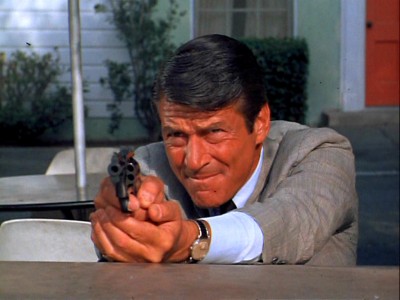
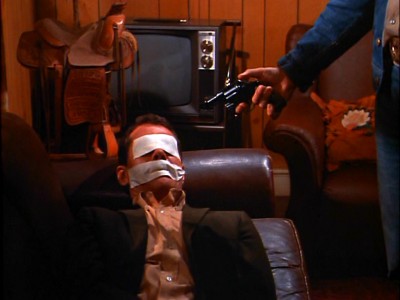
In addition to solving ever single case that came its way, The FBI was racking up the Nielsen numbers, too. Considering that The FBI was one of only four series the slumping ABC network placed in the highly desirable Nielsen Top Thirty (along with Bewitched, The Mod Squad, and The Lawrence Welk Show), it's no surprise that QM Productions quickly got the go-ahead for a season five order by the start of the new year. Occupying its 8 season-long berth at 8:00pm on Sunday nights (its 9th season would see it moved back to 7:30pm), The FBI's new lead-in, Irwin Allen's Land of the Giants, proved to be a solid build for the actioner, getting a younger draw against CBS's aging Lassie and the previous year's surprise one-shot-only hit, Gentle Ben (it dropped out of the Top 30 altogether this season). NBC still offered stiffening competition against The FBI's first half-hour with the second half-hour of Walt Disney's Wonderful World of Color (it rose to 21st for this season). However, The FBI's second half hour competition, NBC's The Mothers-in-Law, and CBS's fading fast The Ed Sullivan Show (down a precipitous ten slots from the 1967-1968 season), couldn't dent The FBI's rise in the ratings--it cracked the Top Twenty for the first time this season with its highest rating to date, landing as the 18th most-watched series on television for the year. Competition the following year from Disney and Bill Cosby, however, would slow up The FBI's climb to the Nielsen Top Ten.
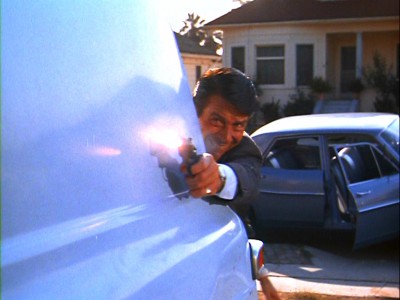
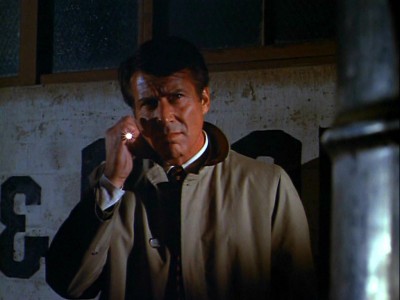
The DVD:
The Video:
The full-screen, 1.37:1 color transfers for The FBI: The Fourth Season, Parts One & Two look a little ruddy, a little reddish, with a sharpish image and no compression issues.
The Audio:
As well, the Dolby Digital English mono audio track is squealchy at times, but all dialogue can be heard. No subtitles or closed-captions.
The Extras:
No extras for The FBI: The Fourth Season, Parts One & Two.
Final Thoughts:
If you want to send a message, try Western Union. The FBI: The Fourth Season, Parts One & Two skips pretty much everything to do with motivation, politics, and sociology to concentrate on telling crackerjack crime stories with a confident ice-cold brio. And thank you very much for that. I'm highly recommending The FBI: The Fourth Season, Parts One & Two.
Paul Mavis is an internationally published movie and television historian, a member of the Online Film Critics Society, and the author of The Espionage Filmography.


|
| Popular Reviews |
| Sponsored Links |
|
|
| Sponsored Links |
|
|
| Release List | Reviews | Shop | Newsletter | Forum | DVD Giveaways | Blu-Ray | Advertise |
|
Copyright 2024 DVDTalk.com All Rights Reserved. Legal Info, Privacy Policy, Terms of Use,
Manage Preferences,
Your Privacy Choices | |||||||









